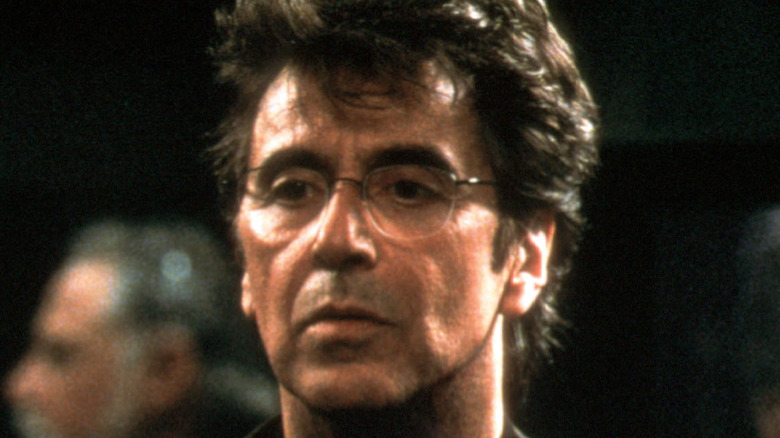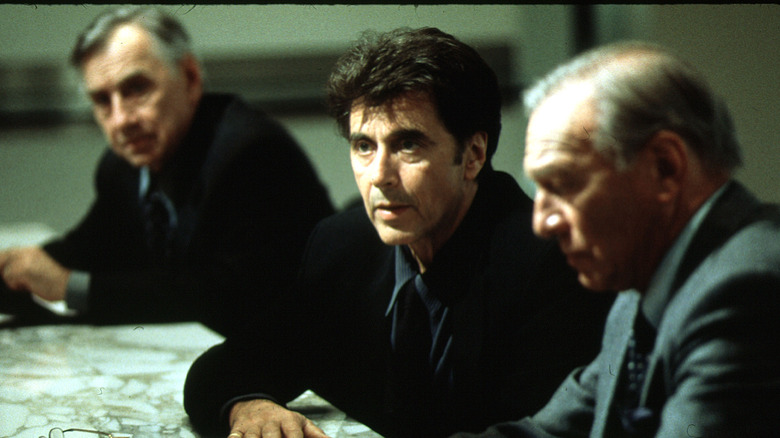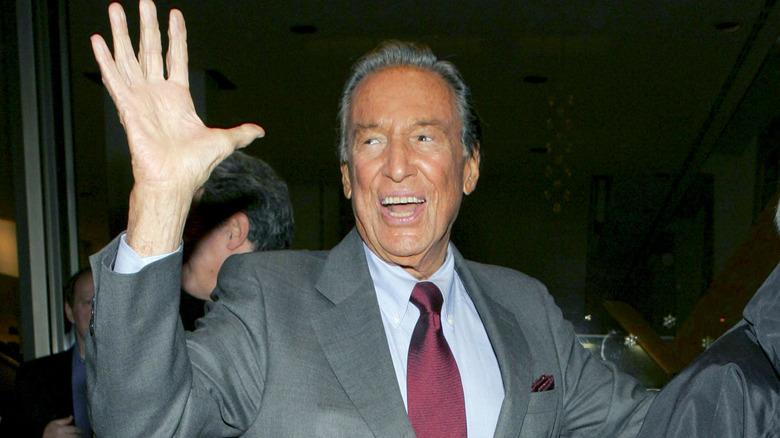The Inside Story On The 60 Minutes Story That Became An Oscar Nominated Film
"60 Minutes" has broadcast countless important stories in its 55 seasons, from the 1968 Presidential campaigns of Richard Nixon and Hubert Humphrey in its first episode in the fall of 1968 to its coverage of the war between Russia and Ukraine last year. But one segment from the February 4, 1996 episode of "60 Minutes" (available on YouTube) grew into a feature film starring Al Pacino and Russell Crowe that went on to earn seven Oscar nominations in 1999, including one for Best Picture and one for Crowe as best actor.
"The Insider," which was directed by Michael Mann and enjoys a 96% rating from critics and a 90% audience approval score on Rotten Tomatoes, tells the story behind the "60 Minutes" broadcast from three years earlier when biochemist and former Tobacco industry researcher Jeffery Wigand (Crowe) went public with his account of how major tobacco companies suppressed the truth about the dangers of nicotine addiction and targeted marketing at children.
"The Insider" further explores how "60 Minutes" producer Lowell Bergman (Pacino) convinces the whistleblower to tell his story despite great risk. The story eventually inspired lawsuits against the industry from the American Cancer Society and the United States Justice Department that together resulted in the largest civil settlement in United States history (via The Truth Initiative).
Tobacco companies were forced to make major changes to their advertising campaigns and packaging that are still apparent more than two decades later. In the end, Wigand's bravery and Bergman's persistence in bringing the truth to light made not only an Oscar-worthy film but transformed the way Big Tobacco was permitted to message their customers and the general public.
Despite containing little to no action, The Insider is a gripping and drama-packed film
A 2019 story by film critic Bilge Ebiri of Vulture marking the 20th anniversary of the film's release noted that "The Insider" was "a movie about people sitting in rooms and talking, and its climax involves everyone calmly watching a television program." Despite the lack of on-screen action, Ebiri said the film was "one of the most absorbing films I've ever seen — a tale of volatile passions and real, stomach-gnawing menace."
That tension is brought to the screen by Al Pacino, who — as Lowell Bergman — works to convince Jeffery Wigand to break his non-disclosure agreement with his former employer Brown and Williamson (the manufacturer of cigarette brands Tareyton and Montclair, among others) and tell his story to "60 Minutes" correspondent Mike Wallace (played by Christopher Plummer).
Bergman also faced resistance from Wallace and "60 Minutes" creator Don Hewitt, who feared that backlash from the story might scuttle CBS' potential upcoming sale to the Westinghouse corporation.
"The Insider" covers Wigand's internal conflict, his back-and-forth with Bergman, and Bergman's battle with his higher-ups, much of which involved telephone conversations between the various parties. "They called me once from the set and asked, 'Do you do anything other than get on the phone?'" Bergman recalls. "'We're going to call this movie The Phone.'"(via Vulture).
Mike Wallace was not happy with how The Insider potrayed events
For his part, veteran "60 Minutes" correspondent Mike Wallace wasn't too thrilled with how the movie showed the internal debate between "60 Minutes" personnel leading up to Wigand's interview being broadcast on the show.
Director Michael Mann said of Wallace, "He detested the film" (via The Hollywood Reporter). Despite the obvious linear connection between the "60 Minutes" piece and The Insider," there was a third step in the telling of Wigand's story: a 2004 piece in Vanity Fair.
Writer Marie Brenner sat with Jeffery Wigand as he reeled from the backlash that the "60 Minutes" broadcast and subsequent film brought his way. He told her, "Just when I thought I was going to get some sleep, the investigators called me at midnight. At six a.m. I was gotten up again by someone from '60 Minutes' telling me I should relax. How am I supposed to relax? ... I am going to lose economically and I am going to lose my family."
Later, Brenner and Wigand's attempted respite in a Louisville restaurant was interrupted by a phone call from his attorneys, enraging the already on-edge Wigand. Even later, she reports that he called to tell her, "The F.B.I. is coming to check out a death threat. My wife, Lucretia, wants me to leave the house ... I have lost my family." It takes the absorption of all three media works — the original "60 Minutes" piece, "The Insider," and Brenner's Vanity Fair story — to appreciate the full impact of Wigand's actions and Bergman's determination on the tobacco industry, the media, and Wigand's family and future.


